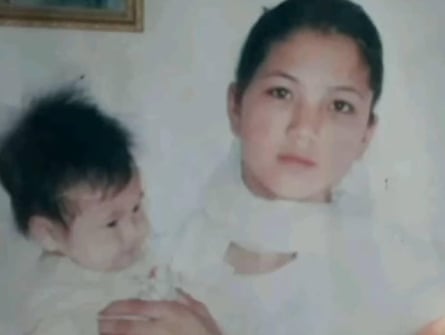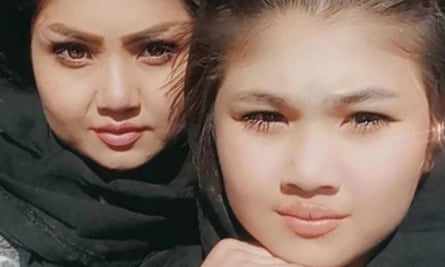Mahtab Eftekhar, as told to Zuhal Ahad
The Guardian
At the age of 10, while still in the third grade, I received news from my mother and stepfather that we would travel to Helmand province for my brother’s wedding. Little did I know, it was to be my own wedding, as my family had arranged my marriage to my cousin and sold me for 40,000 Afghanis [£500], without my knowledge or consent.
That night, after the wedding, I went to sleep beside my mother and little brother, only to wake up next to my cousin. Trembling from confusion and fear, I fled the room in tears and screams. But my mother and her sister coerced me back into that room. It was then that I was told I had been married to my cousin.
It was the beginning of an agonising nightmare that shattered my childhood and adult life.
Two years later in 2007, aged 12, I became a mother for the first time, but my child was born premature and disabled. She soon passed away. The next year, I gave birth to and lost another daughter. My husband’s family had refused to take her to the doctor when she was unwell because she was a girl, and not the boy that they had wanted so much.
In 2010, when I was still only 14, my third daughter was born. She was also sick and below average weight. She got weaker day by day and her skin was getting increasingly yellow.
Relentless abuse from my husband for the misfortune I kept bringing to the family left me exhausted, but the fear of losing my child gave me the strength to flee to my mother’s home in Kabul. After months of treatment at a public hospital, my daughter recovered from jaundice.
I thought moving away from his family, who had encouraged him to mistreat me, might put an end to the physical and mental abuse but it continued nonstop. The fear of losing my children kept me from leaving or seeking a divorce.
Kabul presented a fresh start and better opportunities, especially for my daughter, Zahra, who began attending school. From then on, my primary focus shifted to her education. I would study alongside her, reading her lessons before teaching them to her every evening.
Today, at 14, she excels in English and has a great talent for drawing. When she was younger – and before the Taliban takeover in 2021 – she was invited to participate on television programmes and often talked about the hardships I and many women like me endure in Afghanistan. I relived my childhood and dreams by bringing up such a strong and smart child as Zahra.
At this time, I also took tailoring and beauty courses that led to me gaining work at a nearby salon. Starting with basic tasks such as eyebrow trimming, I eventually established my own beauty parlour in Kabul. Unfortunately, my only source of income and hope was closed by the Taliban after they regained power in 2021.
“If you breathe, you belong to me; otherwise, you belong to the earth,” he told me.

After the Taliban regained power, my daughter was also barred from attending school. As the physical and verbal abuse from my husband intensified, I submitted a formal complaint at the Taliban’s police station, detailing the abuse and how I was forced into a child marriage.
When my husband learned of this, he took my children to Helmand and asked me to drop the case if I wanted to live with them again.
After many days apart from my children, I couldn’t bear it any more and reached out to my daughter. I coordinated with her on the phone to set a meeting time. I travelled to Helmand and, with the help of a family that I met on the bus, I passed all the Taliban checkpoints and was able to reunite with my children.
But on the journey back, near Kandahar city, the Taliban forced me and my children out of the vehicle and took us to a police station. Instead of helping me they beat and verbally abused me for travelling alone.
At first, I did not tell them anything, but then I saw my husband and his family at the police station and understood that they had reported me to the Taliban. My husband’s mother hit me with a rock and accused me of adultery, and abandoning the house and my responsibilities.
I froze as I knew what the consequences of such an accusation could mean for me. If it was proven that I had committed adultery, I would be flogged or stoned to death by the Taliban. I felt as though the entire world was against me.
I tried to defend myself and told the Taliban about my complaint and request for divorce. I pleaded my innocence with the authorities at the station, but they did not listen to me. They had already judged me guilty without any proof. As punishment, they beat me with rifle butts, plastic pipes and whips.
Fearing the consequences of defying the Taliban, I reluctantly agreed to go back with my husband’s family. They told me that my husband would divorce me and that I could keep my daughter but they would take my son. Hoping to secure at least my daughter’s future, I agreed.
But my trials were far from over. During my divorce hearing, the mullahs [Taliban clerics] decided that as a woman who had demanded a divorce, I lost all rights, including obtaining the mahr [dowry] and custody of my five-year-old son. The mahr refers to the money or assets given by the husband to his wife. It is considered the exclusive property of the wife, which she can use to support herself during the marriage or after divorce.
Although I tried to appeal against the verdict in other courts, I got nowhere.
After my divorce was finalised in 2023, I joined women protesting against the Taliban and their oppression of women. Despite my activism, my thoughts never strayed far from my son. Unfortunately, my husband took my son back to Helmand, leaving me devastated.
I sought help from the Taliban’s police, but each time, they refused. Instead, they accused me of adultery and flogged me as a punishment.
Soon after our divorce, my husband brought our son to visit me in Kabul, only to use the opportunity to kidnap our daughter, taking them both back to Helmand.

I was left with no reason to live. No one would rent me an apartment due to my being alone and single and I could not work as women were barred from jobs. So, I put away all my belongings – and the sorrow of losing my children – and left for Iran.
I am now 26 and I have lost everything: my childhood, youth, health and my children. Yet I am grateful to have found my voice. In Iran, I am earning a living working in a tailors’ shop and, at the same time, advocating and amplifying the voices of women in my country.
I am not afraid of dying on this journey to justice. Rather I embrace it, knowing that at least I will be an example for thousands of women enduring similar hardships and inspire them to stand against tyranny.
 Afghanistan Peace Campaign
Afghanistan Peace Campaign